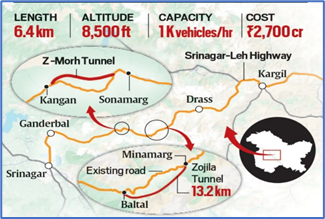Why in news?
Prime Minister Narendra Modi inaugurated the 6.5 km Z-Morh tunnel in Jammu and Kashmir's Ganderbal district.
Built at a cost of ₹2,400 crore on the Srinagar-Leh National Highway, the tunnel ensures seamless connectivity between Gagangir and Sonamarg, facilitating summer travel to Ladakh and improving regional accessibility.
The project, overseen by National Highways and Infrastructure Development Corporation Limited (NHIDCL), began in May 2015 and was completed in 2024. It is hailed as an "engineering marvel" and a game changer for the region.
What’s in today’s article?
- Z-Morh tunnel
- Significance of Z-Morh tunnel
Z-Morh tunnel
- About
- The Z-Morh Tunnel, a strategic infrastructure project connecting Sonamarg to the Kashmir Valley year-round is part of the broader Zojila Tunnel project.
- Zojila Tunnel project aims to ensure uninterrupted connectivity between Srinagar and Ladakh.

- The name “Z-Morh” derives from the Z-shaped roadway that existed before the tunnel’s construction.
- Timeline and Challenges
- Initial Delays: Conceived in 2012 by the Border Roads Organisation (BRO), the project stalled due to financial and administrative challenges under the initial contractor, Tunnelway Ltd.
- Retendering (2019): After IL&FS halted work in 2018 due to financial stress, the project was retendered.
- Duration: Originally expected to be completed by 2016-2017, delays shifted the timeline to 2024 for the Z-Morh Tunnel, while the Zojila Tunnel is targeted for December 2026.
- Soft Opening: Conducted in February 2024, with the final inauguration delayed due to the Model Code of Conduct for Jammu and Kashmir elections.
- Technological Advancements
- The two-lane tunnel features advanced technologies for real-time updates and seamless connectivity.
- Equipped with a 7.5-meter-wide parallel escape passage for emergencies, it ensures enhanced safety and a superior travel experience.
- Vehicles can now travel at speeds of up to 70 km/h, reducing travel time between Srinagar and Sonamarg, with a capacity to handle 1,000 vehicles per hour.
Significance of Z-Morh tunnel
- Strategic Importance
- The Z-Morh Tunnel, located at an altitude of 8,650 feet, plays a crucial role in India's defense needs by ensuring all-weather connectivity to the strategically vital Ladakh region.
- It also strengthens the link between the Union Territory of Ladakh and the rest of the country, bypassing landslide and avalanche-prone routes.
- The tunnel, along with the under-construction Zojila Tunnel, ensures uninterrupted access to Baltal and Ladakh for both civilian and military traffic, boosting regional mobility and strategic preparedness.
- Reduced Dependence on Air Transport
- Currently, the Indian Army relies heavily on the Indian Air Force for maintaining forward positions in Ladakh.
- The Z-Morh Tunnel will enable efficient and cost-effective road transportation of troops, equipment, and supplies, reducing the burden on military aircraft and extending their operational lifespan.
- Defense Preparedness and Geopolitical Advantage
- In a region marked by geopolitical tensions with both Pakistan and China, the Z-Morh Tunnel strengthens India’s defense posture.
- Enhanced road access to critical areas like the Siachen Glacier, the Turtuk sub-sector, and other border posts will allow for faster deployment and better logistical support
- Boost to Winter Tourism
- The Z-Morh Tunnel transforms Sonamarg into a year-round tourist destination by mitigating snowfall-related disruptions.
- It facilitates winter tourism, adventure sports, and economic growth, with the potential to develop Sonamarg into a premier skiing destination, complementing Gulmarg.
- Economic Impact
- By enabling all-weather access to Sonamarg, the tunnel supports local livelihoods, expands tourism opportunities, and paves the way for the development of winter sports infrastructure, significantly contributing to the region's economic growth.










